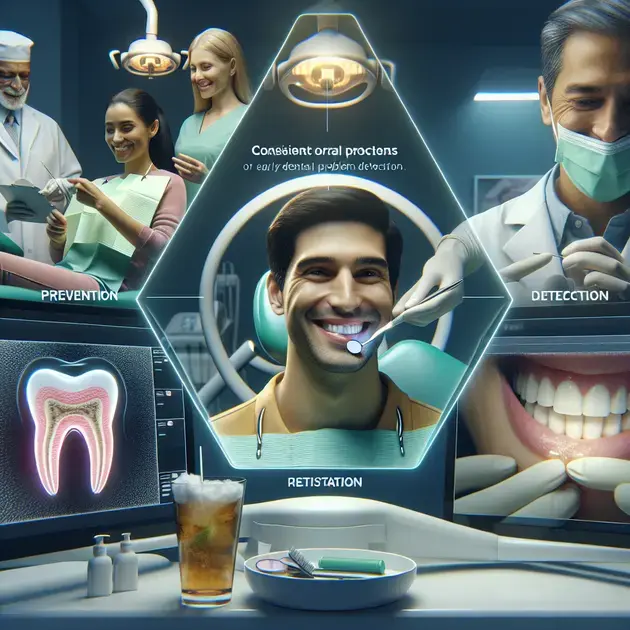When it comes to dental health, failing to address a decayed tooth can have serious consequences. Ignoring the signs of decay, such as tooth sensitivity or pain, can lead to further damage and potential infection.
It is essential to seek treatment from a dentist as soon as possible to prevent the decay from spreading. With advancements in modern dentistry, there are various treatment options available to save a decayed tooth and restore oral health.

The Importance of Early Detection
Early detection of oral health issues is crucial for maintaining a healthy smile. One of the best ways to ensure early detection is by scheduling regular dental check-ups with a qualified dentist. These check-ups typically involve a thorough examination of your teeth and gums, as well as X-rays to detect any underlying issues that may not be visible to the naked eye.
Another important aspect of early detection is being aware of the signs and symptoms of common oral health problems. This includes being on the lookout for things like tooth sensitivity, gum inflammation, and persistent bad breath. By educating yourself on these warning signs, you can take action at the first sign of trouble.
Technology has also played a significant role in early detection. There are now apps available that can help you track your oral health habits, such as brushing and flossing frequency, as well as remind you when it’s time for your next dental appointment. One such app is “Dental Care Diary,” which allows users to input their oral health data and receive personalized reminders.
By prioritizing early detection and utilizing technology to aid in monitoring your oral health, you can stay ahead of any potential issues and maintain a healthy and beautiful smile for years to come.
Preventive Measures for Decay
Preventing decay is a key component of maintaining optimal oral health. One of the most effective ways to prevent decay is by practicing good oral hygiene habits, such as brushing your teeth at least twice a day and flossing daily. This helps remove plaque and bacteria that can lead to decay.
In addition to regular brushing and flossing, using fluoride toothpaste and mouthwash can also help prevent decay. Fluoride is a mineral that strengthens the enamel of your teeth, making them more resistant to acid attacks from plaque bacteria. Look for dental products that contain fluoride to ensure you’re getting the maximum benefits.
Diet plays a significant role in preventing decay as well. Avoiding sugary and acidic foods and drinks can help protect your teeth from decay-causing bacteria. Instead, opt for a balanced diet rich in fruits, vegetables, and calcium-rich foods to keep your teeth strong and healthy.
Regular dental cleanings and check-ups are also essential for preventing decay. Your dentist can remove any built-up plaque and tartar that brushing and flossing may have missed, as well as catch any early signs of decay before they progress. Be sure to schedule bi-annual appointments with your dentist to stay on top of your oral health.
Modern Treatments for Restoring Oral Health
Advancements in dental technology have made restoring oral health more efficient and effective than ever before. One modern treatment for restoring oral health is dental implants, which are a permanent solution for replacing missing teeth. Apps like “Zocdoc” can help you find a qualified implant specialist in your area.
Another modern treatment option is Invisalign, a clear aligner system that straightens your teeth without the need for traditional braces. Invisalign can be obtained through an orthodontist who is trained in this specific treatment method. Websites like “Invisalign’s official site” provide comprehensive information on the treatment process.
Dental crowns and bridges are also common modern treatments for restoring oral health. These prosthetic devices can help restore the function and aesthetics of damaged or missing teeth. Your dentist can provide more information on whether crowns or bridges are the right option for your specific needs.
Overall, modern treatments offer a wide range of options for restoring oral health and achieving a beautiful smile. By staying informed and seeking out qualified dental professionals, you can explore the best treatment options for your individual oral health needs.

Warning Signs of Neglected Dental Hygiene
Proper dental hygiene is crucial for maintaining good oral health and preventing various dental problems. Neglecting dental hygiene can lead to several warning signs that indicate potential issues. One common warning sign of neglected dental hygiene is bad breath, also known as halitosis. Poor brushing and flossing habits can allow bacteria to accumulate in the mouth, leading to unpleasant odors.
Another warning sign is the buildup of plaque and tartar on the teeth. When plaque is not properly removed through regular brushing and flossing, it can harden into tartar, which can only be removed by a dental professional. This buildup can contribute to cavities and gum disease if left untreated.
Bleeding or swollen gums are also indicators of neglected dental hygiene. Gum disease, such as gingivitis, can result from inadequate oral care, causing inflammation and bleeding of the gums. Ignoring these symptoms can progress to more severe forms of gum disease, leading to tooth loss.
Tooth sensitivity is another warning sign that should not be ignored. When dental hygiene is neglected, the protective enamel on the teeth can weaken, exposing the sensitive inner layers of the teeth. This can result in pain or discomfort when consuming hot, cold, or sweet foods and beverages.
Lastly, visible signs of decay or discoloration on the teeth can indicate neglected dental hygiene. Cavities and tooth decay can develop when plaque and bacteria erode the enamel, leading to permanent damage if not addressed promptly. Regular dental check-ups are essential to detect and treat any issues early on.
Common Causes of Tooth Decay
Tooth decay, also known as cavities or dental caries, is a common dental problem that can result from various factors. Understanding the common causes of tooth decay is essential for maintaining good oral health and preventing dental issues. One significant cause of tooth decay is poor oral hygiene habits.
Inadequate brushing and flossing can allow plaque to accumulate on the teeth, leading to enamel erosion and the formation of cavities. Consuming sugary and acidic foods and beverages can also contribute to tooth decay. Bacteria in the mouth feed on sugars and produce acids that attack the enamel, weakening the teeth over time.
Another common cause of tooth decay is dry mouth, which can result from certain medications, medical conditions, or mouth breathing. Saliva plays a crucial role in neutralizing acids and remineralizing the enamel, so a lack of saliva can increase the risk of cavities. Poor dietary choices, such as frequent snacking on sugary foods or drinks, can also promote tooth decay.
Furthermore, dental factors like deep tooth crevices, enamel defects, or orthodontic appliances can make individuals more susceptible to tooth decay. These structural issues can trap food particles and bacteria, making it harder to clean the teeth effectively. Regular dental visits for professional cleanings and preventive treatments are important for reducing the risk of tooth decay.
Overall, maintaining a healthy diet, practicing good oral hygiene, and attending regular dental check-ups are key steps in preventing tooth decay and preserving oral health. By addressing the common causes of tooth decay, individuals can enjoy a healthy and cavity-free smile.
Maintaining Oral Health Through Proper Hygiene
Proper oral hygiene is essential for preserving the health of your teeth and gums and preventing dental problems. By establishing a consistent hygiene routine, you can maintain optimal oral health and avoid issues such as tooth decay, gum disease, and bad breath. Here are some essential steps for maintaining oral health through proper hygiene:
Step 1: Brushing Twice a Day
Brushing your teeth twice a day with fluoride toothpaste helps remove plaque, bacteria, and food particles that can lead to tooth decay and gum disease. Use a soft-bristled toothbrush and gentle circular motions to clean all surfaces of your teeth and along the gumline.
Step 2: Flossing Daily
Flossing daily is crucial for removing plaque and debris from between the teeth and along the gumline. Inadequate flossing can leave bacteria undisturbed, contributing to cavities and gum inflammation. Make sure to floss gently to avoid damaging the gums.
Step 3: Using Mouthwash
Rinsing with an antimicrobial mouthwash can help reduce bacteria in the mouth, freshen breath, and promote healthy gums. Choose a mouthwash with fluoride for added protection against tooth decay.
Step 4: Eating a Balanced Diet
Avoiding sugary and acidic foods and beverages can help prevent enamel erosion and tooth decay. Incorporate tooth-friendly foods like fruits, vegetables, dairy products, and lean proteins into your diet to support oral health.
Step 5: Regular Dental Check-ups
Scheduling routine dental visits for professional cleanings, exams, and preventive treatments is crucial for maintaining oral health. Your dentist can detect early signs of dental issues and provide personalized recommendations for improving your oral hygiene routine.
By following these steps and prioritizing proper hygiene practices, you can support your oral health and enjoy a healthy smile for years to come.
Conclusion
Proper dental hygiene is vital in preventing dental issues such as bad breath, plaque buildup, gum disease, tooth sensitivity, and decay. These warning signs of neglected dental hygiene serve as indicators of potential oral health problems that can arise from poor oral care habits.
Understanding the common causes of tooth decay, including poor oral hygiene practices, sugary diets, dry mouth, and dental factors, highlights the importance of maintaining good oral health. By addressing these causes through proper hygiene routines and regular dental check-ups, individuals can prevent cavities and preserve their oral health.
Following essential steps like brushing twice a day, daily flossing, using mouthwash, eating a balanced diet, and scheduling routine dental visits can help individuals maintain optimal oral health. By prioritizing these practices, individuals can enjoy a healthy smile free from decay, gum disease, and bad breath for years to come.
